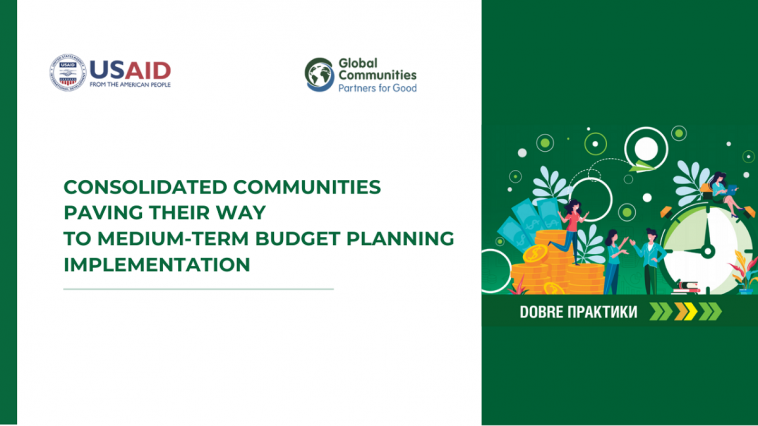In Ukraine for quite some time, activities have been carried out aimed at improving legislation provision for medium-term budget planning at the state and local levels. The process has accelerated since Ukraine signed the EU Association Agreement. According to the Agreement, cooperation in terms of improvement of medium-term budget planning system lies in, first, in learning the EU member states projection practices in order to form most realistic budget forecasts. The reason for medium-term budget planning system development within the EU was in the understanding that a budget process surpasses the budget compilation and execution framework during one year. Ukraine has partially implemented the mechanisms for medium-term budgeting at the state level. However, at the local level, in consolidated communities there are still a lot of questions to be resolved.
The main issue at the community level implies the fact that medium-term budget plan formation is actually done with the “up-to-bottom” and not “bottom-up” approach to budgeting: local governance representatives commence medium-term budget planning based on the data indicators provided. Hence, with the State Budget planning in the background, the local budget planning looks less realistic. Due to the amendments made in the Budget Code (Draft Law #3279-d adopted), suspended are the provisions of Article 33 in regard to budget declaration compilation and approval; Article 75, Part 1 as per local budget projections; and Article 75-1 concerning local budget projection building and adoption.
During 2020, cooperating with three partner consolidated communities (Lanovetska, Terebovlyanska and Zborivska CCs), USAID DOBRE Program experts implemented elements of medium-term budget planning and formulated recommendations in a proposed handbook “On Implementing Integral Medium-term CC Budget Planning” (in Ukrainian).
According to a DOBRE Program letter from the Ministry of Finance of Ukraine in July “[The handbook] is developed for local governance financial body representatives, for consolidated communities; it contains an overview of current legislation; describes stage-by-stage steps for implementing medium-term budgeting at the level of a consolidated community, and proposes created document templates…The manual can be recommended for further application in the work of staff at local finance entities in consolidated communities.”
According to Tetyana Ovcharenko, Financial Management Consultant at DOBRE Program: “Medium-term budget planning allows avoidance of inefficient spending and provides planners with resources and selected policies for attaining goals. The budget planning process at the medium-term perspective, as a method for improving budget decision-making process, is widely applied not only in developed countries, but the majority of developing countries as well. The handbook theme topicality is proved with the objective necessity to establish in Ukraine, in contrast to traditional approaches, an effective system of integral medium-term budget planning in order to increase result outcomes and transparency in budgeted funds spending, including CC budget levels.”
Considering the aforementioned, DOBRE Program specialists recommend that medium-term budget planning implementation should be based on the following principles:
- Strategic and method-based – development of strategies and local programs should be oriented at resolving a wide range of social, economic and ecology-related issues. These strategies include problematic cases of a specific territory and take into account interests of all community members. Approval of strategic program documentation is the foundation for implementing effective medium-term budget planning in a CC.
- Integral – medium-term budget planning implies rational fundraising and resource allocation to respond to the priorities formed, and building up general budget and tax payment accountability among local governance representatives.
“We hope that local budgets on the whole will win from implementing medium-term budget planning, which will allow performing better quality resource allocation of a CC to cover long-term complex projects such as major repair and infrastructure projects. Besides, we will have established policies, thus, budget and tax legislation will not be amended every year,” said Volodymyr Bagriy, Financial Manager in Zborivska CC.
To sum up, consolidated communities will be able to create gradually a system for medium-term budget planning. Applying the earlier mentioned handbook, encompassing theory and practical recommendations, will introduce good methodology grounds for further local governance operations. Implementing integral medium-term budgeting will enable CCs to achieve budgeted funds economy; ensure purpose-oriented budget spending; and carry out efficient operations by budget responsible staff through the sound management decisions made.
***
Decentralization Offering Better Results and Efficiency (DOBRE) Program is USAID’s five-year program, implemented by international organization Global Communities, and funded by the United States Agency for International Development (USAID). The Program is working to enhance good local governance and create improved conditions for the development of consolidated communities (CCs), increase citizen engagement in decision-making, and ensure accountability and transparency in public administration. The DOBRE Program implementing Consortium, led by Global Communities, includes: Ukrainian Crisis Media Center (UCMC); SocialBoost; Foundation in Support of Local Democracy (FSLD/FRDL), Malopolska School of Public Administration at the Krakow University of Economics (MSAP/UEK), Poland; National Democratic Institute (NDI).
The USAID DOBRE Program operates in 7 target Oblasts: Dnipropetrovsk, Ivano-Frankivsk, Kharkiv, Kherson, Kirovohrad, Mykolayiv, and Ternopil. Since June 2020, DOBRE Program started operating in three more Oblasts: Zaporizhzhia, Chernivtsi and Chernihiv.



